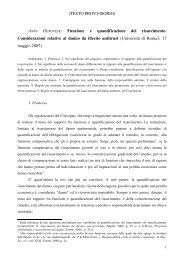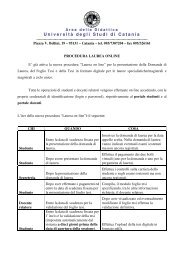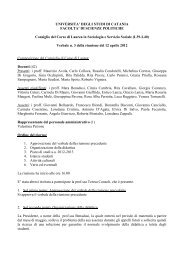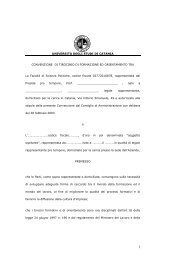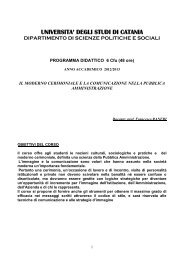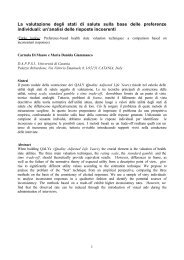(EUBAM) Libya
(EUBAM) Libya
(EUBAM) Libya
Create successful ePaper yourself
Turn your PDF publications into a flip-book with our unique Google optimized e-Paper software.
ReSHAPE Online Papers Series, no. 03/13 – June 2013<br />
The EU’s crisis management actorness and the <strong>Libya</strong>n crisis<br />
The European Union’s role and capability in international actions has been changing<br />
considerably in the last years. In 1992, the Maastricht Treaty created a range of mechanisms such as<br />
the Common Foreign and Security Policy (CFSP) and the European Security and Defense Policy<br />
(ESDP). In 1999, at Helsinki, the European Council increased its commitment in building the EU’s<br />
military and civilian capabilities in peace operations and post-conflict reconstruction.<br />
Will the EU become a global actor in international crisis management<br />
Since 2003, the EU has conducted civilian and military crisis management operations in the<br />
framework of the European Security and Defense Policy (CSDP), spanning from police and border<br />
assistance missions to robust military operations. In 2004, the EU created the border agency<br />
FRONTEX to coordinate operations between member states in securing the external borders of the<br />
Schengen area.<br />
In 2007, the Lisbon Treaty, signed also to allow the EU to become a more effective global<br />
actor, strengthened the role of the Common Security and Defense Policy (CSDP). Its remit was<br />
expanded to include the processes of post-conflict stabilization, joint disarmament operations and<br />
the “fight against terrorism”. Also, the Lisbon Treaty made two significant changes to the<br />
framework established by the Amsterdam one: the advancement of the powers of the High<br />
Representative of the Union for Foreign Affairs and Security Policy and the introduction of the<br />
European External Action Service (EEAS), the diplomatic service of the Union under the authority<br />
of the new High Representative. These changes represented an attempt to introduce new elements to<br />
make the European Council more effective, consistent and transparent for the management of<br />
foreign affairs and the CFSP. The gradual establishment of additional foreign and defense policy<br />
competences at the European level, like crisis management, has been accomplished through a<br />
progressive movement from intergovernmentalism to supranational decision-making, a disclosed<br />
commitment to multilateralism and an increased role for supranational actors and institutions in<br />
Brussels. Briefly, the European Union has “high strategic ambitions”. The question is “how to shift<br />
from words to deeds”. Up to now, the accomplishments of such ambitions have been very modest,<br />
sometimes insignificant. “Rubber stamping” and “upgrading documents” produced by diplomats<br />
and the Ministers of Foreign Affairs, as Youri Devuyust remarks (2012).<br />
Such a view some scholars share about the actorness of the EU and its legitimacy, however,<br />
acknowledges the institutional changes introduced by the Treaty of Lisbon in the current years, and<br />
looks at whether the Union is able to meet its ambitions to become “an actor capable of intervening<br />
in all theatres of the world and of playing responsibility in all the major global institutions” (Attinà,<br />
2011: 10). In other terms, it looks at understanding if the innovations introduced in 2009 will<br />
improve the decision-making and leadership of the European Union, namely its effectiveness as a<br />
global player in international crisis management.<br />
Did the EU response to the 2011 <strong>Libya</strong>n crisis undermine the credibility of the CSDP<br />
The EU response to the crisis situation in Lybia led some analysts to underline the lack of<br />
unanimity and joint decisions and the Member States’ unilateralism in action. Some of them called<br />
the <strong>Libya</strong>n crisis as the “death sentence” of the CSDP, or at least highlighted that the EU’s reaction<br />
has undermined the credibility and effectiveness of the CSDP and of the newly-founded European<br />
External Action Service (EEAS).<br />
The crisis in <strong>Libya</strong> escalated at the beginning of 2011, less than 2 years after the Lisbon<br />
Treaty came into force. On 1 April 2011, the Council of the EU adopted the decision to dispatch a<br />
European Union military operation (EUFOR <strong>Libya</strong>) in “support of humanitarian assistance<br />
Francesca Arcidiacono, EU Border Assistance Mission (<strong>EUBAM</strong>) <strong>Libya</strong>: Testing EU Actorness - 2



